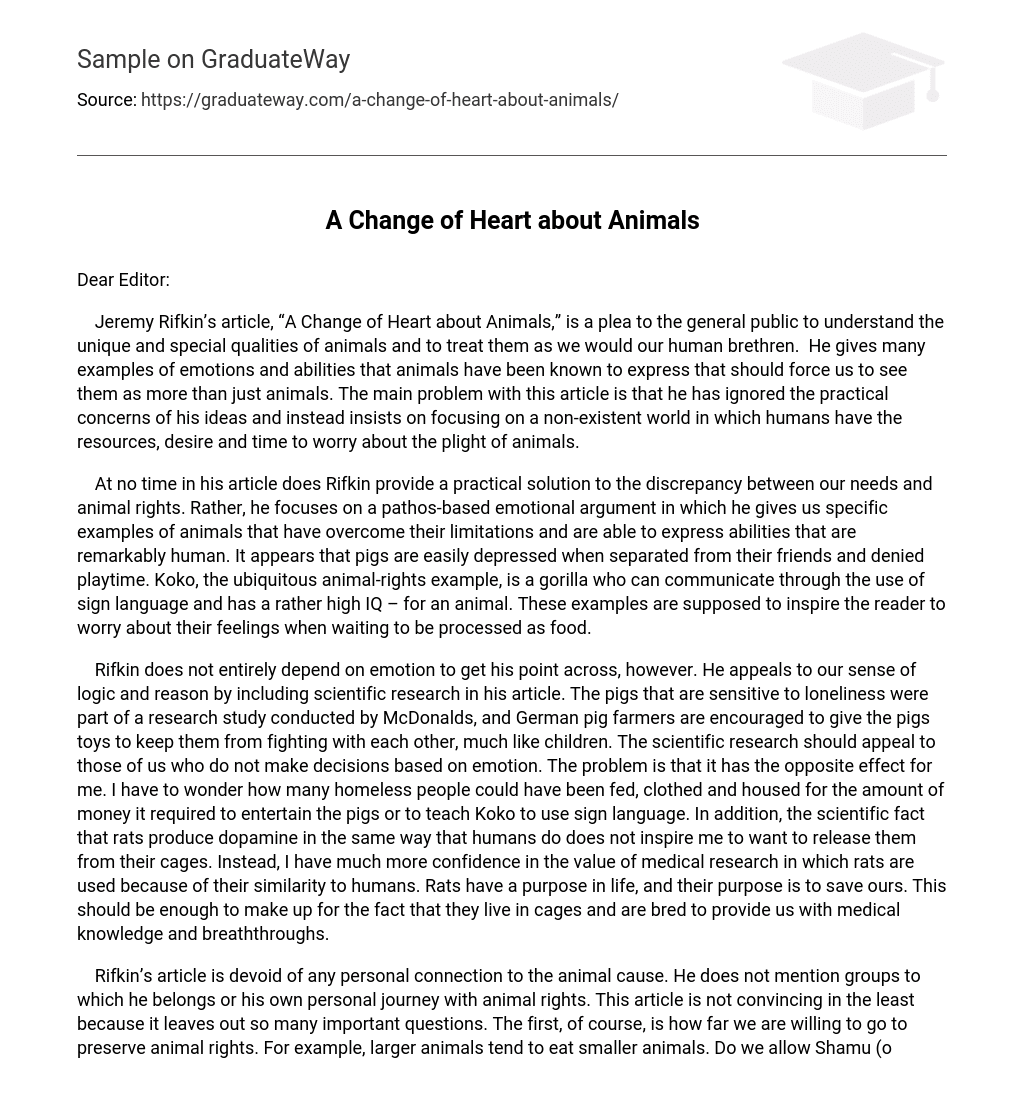Dear Editor:
Jeremy Rifkin’s article, “A Change of Heart about Animals,” is a plea to the general public to understand the unique and special qualities of animals and to treat them as we would our human brethren. He gives many examples of emotions and abilities that animals have been known to express that should force us to see them as more than just animals. The main problem with this article is that he has ignored the practical concerns of his ideas and instead insists on focusing on a non-existent world in which humans have the resources, desire and time to worry about the plight of animals.
At no time in his article does Rifkin provide a practical solution to the discrepancy between our needs and animal rights. Rather, he focuses on a pathos-based emotional argument in which he gives us specific examples of animals that have overcome their limitations and are able to express abilities that are remarkably human. It appears that pigs are easily depressed when separated from their friends and denied playtime. Koko, the ubiquitous animal-rights example, is a gorilla who can communicate through the use of sign language and has a rather high IQ – for an animal. These examples are supposed to inspire the reader to worry about their feelings when waiting to be processed as food.
Rifkin does not entirely depend on emotion to get his point across, however. He appeals to our sense of logic and reason by including scientific research in his article. The pigs that are sensitive to loneliness were part of a research study conducted by McDonalds, and German pig farmers are encouraged to give the pigs toys to keep them from fighting with each other, much like children. The scientific research should appeal to those of us who do not make decisions based on emotion. The problem is that it has the opposite effect for me. I have to wonder how many homeless people could have been fed, clothed and housed for the amount of money it required to entertain the pigs or to teach Koko to use sign language. In addition, the scientific fact that rats produce dopamine in the same way that humans do does not inspire me to want to release them from their cages. Instead, I have much more confidence in the value of medical research in which rats are used because of their similarity to humans. Rats have a purpose in life, and their purpose is to save ours. This should be enough to make up for the fact that they live in cages and are bred to provide us with medical knowledge and breaththroughs.
Rifkin’s article is devoid of any personal connection to the animal cause. He does not mention groups to which he belongs or his own personal journey with animal rights. This article is not convincing in the least because it leaves out so many important questions. The first, of course, is how far we are willing to go to preserve animal rights. For example, larger animals tend to eat smaller animals. Do we allow Shamu (of Sea World fame) to starve in order to preserve the lives of the fish on which she must feed in order to stay alive? How do we rank animal importance?
In thousands of years, when the problems of disease, war, illiteracy, unemployment and homelessness are resolved, we may have the time and the funds to consider how to treat animals ethically while still preserving our basic need to use animals for food and clothing. Humans need to come first – it would be cruel to put the needs of a cow in front of the needs of a child. It is entirely possible that our human problems will eventually be solved and leave us time to worry about animals. At that time, we may be able to “deepen our empathy to include the broader community of creatures with whom we share the Earth.” Until that time, however, we need to continue to utilize animals for our own good.





